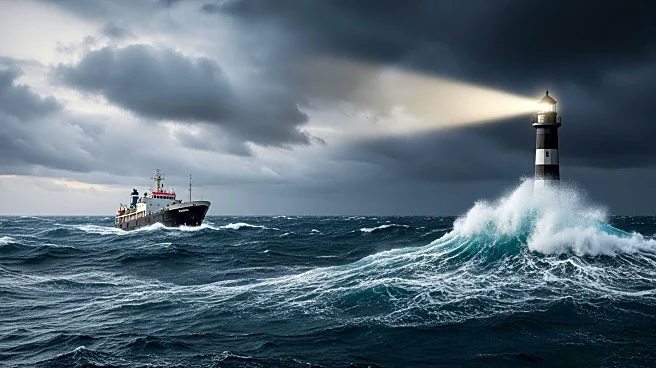What is the story about?
What's Happening?
The Israeli military has intercepted the final boat in an aid flotilla attempting to breach the naval blockade of Gaza. This action follows the interception of other vessels in the flotilla, which included approximately 450 activists, among them Swedish campaigner Greta Thunberg. The flotilla, organized by the Global Sumud Flotilla, aimed to deliver humanitarian aid to Gaza. However, Israeli forces took control of the last ship, the Marinette, about 42.5 nautical miles from Gaza, leading it to Ashdod port in Israel. The Israeli foreign ministry has stated that the flotilla was warned about entering an active combat zone and violating a lawful naval blockade. The ministry has begun deporting the activists, with four Italians already deported and others in the process. Protests against the interception have erupted in various cities worldwide, including European capitals and cities like Karachi, Buenos Aires, and Mexico City.
Why It's Important?
The interception of the flotilla highlights the ongoing tensions surrounding the Israeli blockade of Gaza, which has been a point of international contention. The blockade, justified by Israel as a security measure against Hamas, has been criticized by various international actors as a humanitarian issue. The flotilla's interception has sparked global protests, indicating widespread international concern and opposition to the blockade. The situation underscores the complex geopolitical dynamics in the region, involving humanitarian, security, and political dimensions. The deportation of activists and the global protests could further strain Israel's diplomatic relations and impact its international standing.
What's Next?
The situation may lead to increased diplomatic activity as countries and international organizations respond to the interception and deportation of their citizens. The U.S. has proposed a plan to end the conflict, which includes demands for Hamas to surrender, with President Trump offering to oversee temporary governance of Gaza. The response from Hamas and the international community to this proposal will be crucial in determining the next steps in the conflict. Additionally, continued global protests could pressure governments to take a more active role in addressing the humanitarian situation in Gaza.
Beyond the Headlines
The incident raises questions about the legality and ethics of the naval blockade and the interception of humanitarian aid efforts. It also highlights the broader issue of freedom of navigation and the rights of activists to challenge perceived injustices. The portrayal of activists as 'terrorists' by Israeli officials could influence public perception and policy decisions, potentially affecting future humanitarian missions and international relations.















